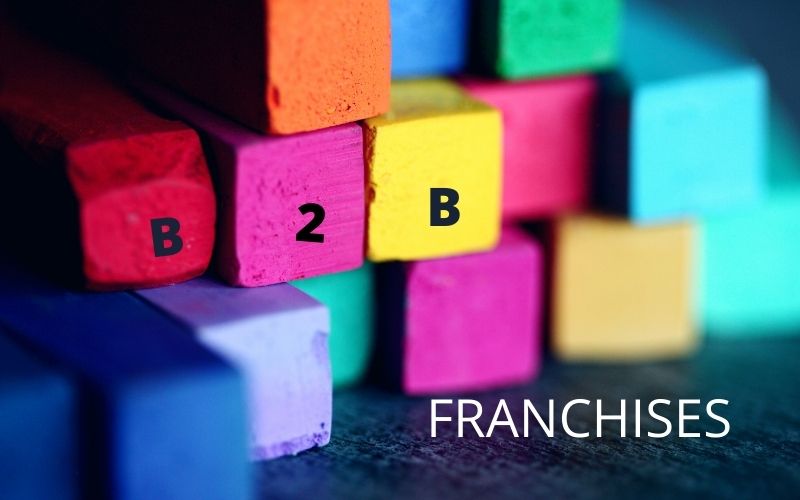More and more people are turning to franchise ownership as a way to start their own businesses quickly. However, choosing the right franchise model that fits with your goals can be challenging. If you’re facing this dilemma, consider exploring B2B franchises.
They offer many advantages over other business models and sizes.
B2B franchises provide entrepreneurs with promising opportunities for future growth and profitability. The global B2B market is currently valued at an impressive $7,907.07 billion as of 2022.
To help you make an informed decision about the most suitable franchise type and model for your entrepreneurial journey, this article aims to explain the concept of B2B franchises and highlight their distinct advantages over alternative models.
Additionally, it aims to clarify the differences between B2B franchises and other franchise types and assess their feasibility for beginners in the franchising world.
What is a B2B Franchise Model?
A B2B (business-to-business) franchise model is a franchise business type that primarily focuses on providing products or services to other businesses rather than to individual consumers. In other words, the franchisee’s clients are other businesses that require their goods or services in order to operate effectively.
This model is characterized by a long-term relationship building between the franchisee and its business clients, which can lead to a stable revenue stream and consistent customer base. B2B franchises may offer a wide range of products or services such as software solutions, printing and marketing services, business coaching, and consulting.
B2B franchises can be advantageous because they typically have lower marketing and advertising costs, as they focus on building long-term relationships with a smaller number of clients.
Also, B2B franchise owners may benefit from recurring revenue and higher profit margins due to the nature of their business relationships.
B2B franchise has two types:
B2B services franchises…
provide services or assistance that another company needs. For example, an accounting firm franchise can offer financial and payroll management services to a fast-food franchise.
B2B product franchises,
in contrast, franchise businesses offer merchandise that meets the needs of other businesses. For example, a graphics and sign franchise can provide a coffee shop with custom-printed plastic cups.
Despite their differences, both B2B services and B2B product franchises aim to form partnerships and close deals with other local businesses, in their respective areas.
As for the benefits of owning a business-to-business franchise, they include lower marketing and advertising costs, higher profit margins, and a stable customer base due to long-term business relationships.
Additionally, B2B franchises often offer ongoing training, and support to franchisees, helping them run their businesses more efficiently.
6 Advantages of Owning a B2B Franchise

Even if there are benefits of owning a franchise business, the b2b franchise to be exact also comes with advantages that one should know. B2B may not that well-known, especially to franchising newbies. But, to get to know more, below is the list of its edges among the rest.
1. The target market is on a larger scale
Since a b2b franchise targets companies or other businesses, it has a wider scope of providing services or products. The target market of business to business franchises is typically on a larger scale than other franchise business sector, as they provide products or services to other businesses instead of individual consumers.
This means that B2B franchises may have fewer customers overall, but those customers are typically larger businesses that require more substantial orders and are more likely to maintain long-term relationships with the franchisee.
As a result, B2B small businesses can offer a more stable revenue stream than other franchise models, as their business relationships tend to be more reliable and consistent over time.
To illustrate, take the coffee shop from before—consider how many cups they need to be printed each week by a graphics and signage company. It could be anywhere from hundreds to thousands in a month! That’s just for one establishment, with an individual order; what if it has established multiple relationships with other businesses within its boundaries?
2. Higher profitable returns compare to B2C
Generally, B2B franchises have the potential to be more profitable than B2C (business-to-consumer) retail franchises due to several factors.
- B2B franchisees typically work with larger businesses that require more substantial orders, resulting in higher revenue per transaction. In contrast, B2C franchisees may have to sell products or services at lower price points to appeal to individual consumers.
- It often has lower marketing and advertising costs as they tend to focus on building long-term relationships with a smaller number of clients. This reduces the need for costly marketing campaigns and can result in higher profit margins.
- B2B may have higher customer retention rates, as their business clients often have ongoing needs for their products or services. This can lead to more reliable and consistent revenue streams, as opposed to B2C franchises that may have to continually attract new customers to maintain their sales.
However, it’s important to note that the profitability of a franchise ultimately depends on several factors, such as market demand, competition, and the franchisee’s management skills.
3. B2B franchise establishes long-term business relationships
B2B franchises typically establish long-term business relationships with their clients, which can lead to a more stable and reliable revenue stream compared to B2C (business-to-consumer) franchises. This is because B2B franchises often work with larger businesses that have ongoing needs for their products or services, leading to recurring orders and contracts.
In addition, building long-term relationships with clients can lead to increased customer loyalty, resulting in fewer customer losses and the potential for more referrals and repeat business. B2B franchises often focus on providing high-quality customer service, innovative solutions and personalized solutions to meet the specific needs of their clients, which can further strengthen their business relationships.
Developing solid, long-term business partnerships is fundamental to the success of B2B franchises as it allows for a dependable revenue stream, heightened customer commitment, and chances for business development, and expansion.
4. Less operational expenses

B2B franchises may have the lowest upfront investment requirements than other franchises due to several factors. For instance, B2B franchises typically work with medium sized businesses with a smaller number of clients, resulting in less need for expensive marketing campaigns and a reduced need for storefronts in prime locations.
Moreover, B2B franchises may have more predictable demand patterns and longer contract cycles, which can help them better manage their inventory and production costs. This can reduce the need for excess inventory, resulting in lower storage and transportation expenses.
In addition, B2B franchises often have established systems and procedures in place, which can lead to greater operational efficiency and lower administrative costs. For instance, B2B franchises may have automated invoicing and payment systems in place, which can reduce the need for manual billing and accounting tasks.
5. B2b franchise quickly generates particular leads
B2B franchises can generate leads quickly and effectively, as they often have established networks strong relationships and partnerships in their specific industry or niche. This can allow them to leverage existing relationships to generate leads and referrals, resulting in a more efficient and targeted approach to lead generation.
In addition, B2B franchises may have access to industry-specific databases or directories, which can provide them with a list of potential leads to target. This can help them save time and resources by targeting leads that are more likely to convert into customers.
Moreover, B2B franchises may use targeted marketing campaigns to reach their ideal customers, such as email marketing, social media advertising, or attending industry-specific events and trade shows. This can help them generate leads and increase their visibility in their target market.
Overall, B2B franchises can generate leads quickly and efficiently due to their established networks and partnerships, industry-specific databases, and targeted marketing campaigns. This can result in a more effective approach to lead generation and increased sales opportunities.
6. Sales revenue is fast
While B2B franchises may generate leads quickly, the process of closing a sale can take longer than B2C (business-to-consumer) franchises, as the sales cycles in both industries of B2B can be more complex and involve multiple decision-makers.
However, once a sale is closed, B2B franchises may see faster and more substantial sales revenue due to the larger volume of products or services being sold and the potentially longer contract cycles. B2B franchises may also benefit from recurring revenue streams from ongoing contracts and orders from their clients, which can provide more stability and predictability in their sales revenue.
Overall, while the sales cycle for B2B franchises may be longer, they may see faster and more substantial sales revenue once a sale is closed, due to the larger volume of products or services being sold and the potential for recurring revenue from multiple streams together.
Are you Qualified to Own a B2B Franchise?

One of the major values of B2B franchise ownership is that you do not necessarily need to have experience in a particular field to become a franchisee in that field. Franchise systems provide extensive training and help. The purpose is to make you the right person who can be successful without prior industry experience.
As an example, a firefighter can discover a career path by becoming a franchise owner of a printer/copier cartridge refilling business. A CFO may find a second career providing window blinds to office buildings. What can be more important than experience is that you have certain personality traits needed in that business.
As a B2B franchisee,
you will obviously need to be very comfortable with meeting people and networking with other business owners. General sales or marketing experience may be helpful in many businesses applications. Even more, a firm belief in your product or service will help you sell its benefits to your clients.
Of course, hiring a salesperson to drive in business may be a good strategy if you lack sales experience. A willingness to follow the franchisor’s systems and processes is a necessity for any franchisee.
If you tend to constantly reinvent strategies and approaches, being a franchise owner may not lead to happiness or success for you. Those most likely to be successful franchisees understand that the franchisor’s business model has been constructed. And it is for the sole purpose of providing the franchisee with the greatest chance for success.
Final Thoughts
Are you yearning to start a B2B business?
Joining forces with an established, successful franchise company is likely the best move. You will find all the training, help, and camaraderie that you’ve been looking for. Their pre-existing operating systems and models allow you to quickly get up and running!
It’s important not to overlook the vast opportunities within the ever-growing sphere of B2B franchises – whether it be a product or service offered, there are boundless possibilities ahead if this is what interests you most.
For an in-depth comprehension of franchising, consult a veteran franchise consultant for advice.
Bonus Read: “Turnkey Franchise: Is it Profitable to Own?”


